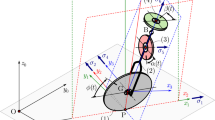Abstract
This paper presents an adaptive hierarchical decoupling sliding-mode speed controller for an electric unicycle. A completely dynamic model of the electric unicycle moving in a flat terrain is derived using Lagrangian mechanics. With the model, an aggregated hierarchical sliding-mode control is used to accomplish robust self-balancing and velocity control (regulation) of the electric unicycle incorporating with viscous and static frictions. Computer simulations and experimental results are conducted for illustration of the effectiveness and applicability of the proposed control method.
Access this chapter
Tax calculation will be finalised at checkout
Purchases are for personal use only
Preview
Unable to display preview. Download preview PDF.
Similar content being viewed by others
References
Honda Com. (2009), http://www.honda.co.jp/news/2009/c090924.html
Sheng, Z., Yamafuji, K.: Postural stability of a human riding a unicycle and its emulation by a Robot. IEEE Trans. Robot. and Auto. 13(5), 709–720 (1997)
Brown Jr, H.B., Xu, Y.: A single-wheel, gyroscopically stabilized robot. IEEE Robotics & Automation Magazine 4(3), 39–44 (1997)
Pathak, K., Agrawal, S.K.: An integrated path-planning and control approach for non-holonomic unicycles using switched local potentials. IEEE Trans. Robotics and Automation 21(6), 1201–1208 (2005)
Cedervall, S., Hu, X.: Nonlinear Observers for Unicycle Robots with Range Sensors. IEEE Trans. Automatic Control 52(7), 1325–1329 (2007)
Jin, Z., Zhang, G.: the nonholonomic motion planning and control of the unicycle mobile robot. Proc. Intelligent Control and Automation (1), 3461–3465 (2006)
Colli, V.D., Tomassi, G., Scarano, M.: Single wheel longitudinal traction control for electric vehicles. IEEE Trans. Power Electronics 21(3), 799–808 (2006)
Ricky, G.: The Electric Unicycle Riding (aunicycle is the most useless thing you can do,) (2007), http://tlb.org/eunicycle.html
Oryschuk, P., Salerno, A., Al-Husseini, A.M., Angeles, J.: Experimental Validation of an Underactuated Two-Wheeled Mobile Robot. IEEE/ASME Trans. on Mechatronics 14(2), 252–257 (2009)
Grasser, F., Arrigo, A.D., Colombi, S.: JOE: A Mobile, Inverted Pendulum. IEEE Trans. Indus. Elec. 49(1), 107–114 (2002)
Pathak, K., Franch, J., Agrawal, S.K.: Velocity and position control of a wheeled inverted pendulum by partial feedback linearization. IEEE Trans. Robotics and Automation 21(3), 505–513 (2005)
Zhao, D., Deng, X., Yi, J.: Motion and Internal Force Control for Omnidirectional Wheeled Mobile Robots. IEEE/ASME Trans. on Mech. 14(3), 382–387 (2009)
Conceicao, A.S., Moreira, A.P., Costa, P.J.: Practical Approach of Modeling and Parameters Estimation for Omnidirectional Mobile Robots. IEEE/ASME Trans. on Mechatronics 14(3), 377–381 (2009)
Low, C.B., Wang, D.: GPS-Based Tracking Control for a Car-Like Wheeled Mobile Robot With Skidding and Slipping. IEEE/ASME Trans. on Mechatronics 13(4), 480–484 (2008)
Damien, L.D., Grand, C., Faiz, B.A., Guinot, J.C.: Doppler-Based Ground Speed Sensor Fusion and Slip Control for a Wheeled Rover. IEEE/ASME Trans. on Mechatronics 13(4), 484–492 (2009)
Liaw, H.C., Shirinzadeh, B.: Neural Network Motion Tracking Control of Piezo-Actuated Flexure-Based Mechanisms for Micro-/Nanomanipulation. IEEE/ASME Trans. on Mechatronics 14(5), 517–527 (2009)
Tsai, C.C., Huang, H.C., Lin, S.C.: Adaptive Neural Network Control of a Self-balancing Two-wheeled Scooter. IEEE Trans. on Industrial Electronics 57(4), 1420–1428 (2010)
Lo, J.C., Kuo, Y.H.: Decoupled fuzzy sliding-mode control. IEEE Trans. on Fuzzy Systems 6(3), 426–435 (1998)
Lin, C.M., Mon, Y.J.: Decoupling Control by hierarchical fuzzy sliding-mode controller. IEEE Trans. on Control System Technology 13(4), 593–598 (2005)
Wang, W., Liu, X.D., Yi, J.Q.: Structure design of two types of sliding-mode controllers for a class of under-actuated mechanical systems. IET Proc. of Control Theory and Applications 1(1), 163–172 (2007)
Author information
Authors and Affiliations
Editor information
Editors and Affiliations
Rights and permissions
Copyright information
© 2011 Springer-Verlag Berlin Heidelberg
About this paper
Cite this paper
Lin, SC. (2011). Adaptive Sliding-Mode Speed Control for Electric Unicycle. In: Li, TH.S., et al. Next Wave in Robotics. FIRA 2011. Communications in Computer and Information Science, vol 212. Springer, Berlin, Heidelberg. https://doi.org/10.1007/978-3-642-23147-6_13
Download citation
DOI: https://doi.org/10.1007/978-3-642-23147-6_13
Publisher Name: Springer, Berlin, Heidelberg
Print ISBN: 978-3-642-23146-9
Online ISBN: 978-3-642-23147-6
eBook Packages: Computer ScienceComputer Science (R0)




